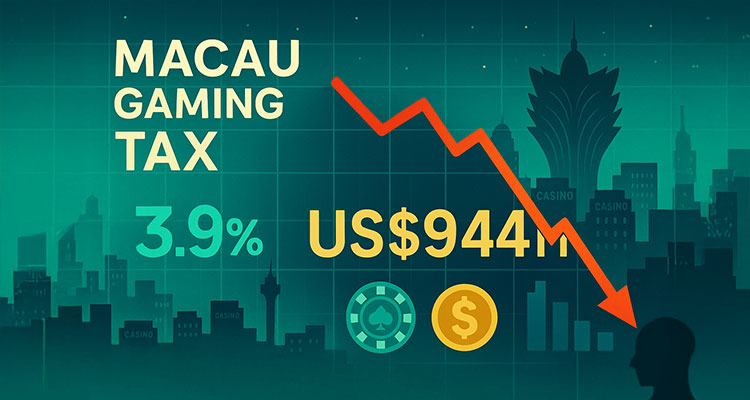Macau’s public finances experienced a modest contraction during the initial four months of 2025, as overall revenue declined by 4.95% compared to the same stretch in 2024. Data released by the Financial Services Bureau (DSF) and cited by Macau Business reveal that the government collected approximately MOP34 billion (US$4.25 billion) in current revenue during this period.
The primary cause of this decline was a near-total collapse in financial income. This revenue category—comprising returns from investments, dividends, and interest linked to the Monetary Authority of Macau—plummeted from MOP1 billion (US$125 million) in the first four months of 2024 to a mere MOP6,000 (US$750) this year.
While this sharp drop had a tangible impact on the city’s fiscal inflow, revenue from gaming taxes remained essentially flat, showing only a marginal decrease of 0.06% and totaling MOP29.8 billion (US$3.7 billion). This figure represented approximately 87.7% of all current revenue for the period, underscoring the outsized role the casino sector continues to play in the Special Administrative Region’s economy.
Gaming Tax Revenue Stagnant Despite GGR Uptick
Tax revenue from Macau’s gaming industry showed little change year-on-year for the January–April stretch, as the MOP29.84 billion collected stood almost level with the same timeframe in 2024. Despite gross gaming revenue (GGR) seeing a slight 0.8% increase to reach MOP76.51 billion (US$9.54 billion), the tax take did not follow suit.
It’s important to note that gaming tax receipts do not align directly with GGR figures due to inherent reporting lags. The taxes collected in any given month generally reflect GGR from the previous month, a dynamic that has caused misalignment between actual gaming performance and reported fiscal intake.
For instance, in April alone, gaming tax income dropped 3.9% compared to March, totaling around MOP7.64 billion (US$944 million). This April figure corresponds to March’s GGR of MOP19.66 billion (US$2.45 billion), which, while up 0.8% on a yearly basis, was slightly below February’s results.
Budget Projections and Fiscal Outlook for 2025
The Macau government has outlined ambitious fiscal goals for the current year, aiming to collect MOP93.12 billion (US$11.6 billion) in gaming tax revenue. With MOP29.8 billion secured by the end of April, the government has reached roughly 32% of that annual target.
Similarly, the broader casino sector is expected to generate MOP240 billion (US$29.7 billion) in GGR by year-end, placing the MOP76.5 billion recorded thus far at about 31.9% of the full-year projection.
In the face of tepid financial returns and unremarkable gaming tax growth, Chief Executive Sam Hou Fai has voiced concerns regarding the potential for a budgetary shortfall in 2025. During his Policy Address in mid-April, Sam highlighted the need to reassess the budget, taking into account the gaming outlook and additional pending expenditures.
Despite these cautionary signals, the SAR ended April with a fiscal surplus of MOP10.3 billion (US$1.29 billion). Although this reflects an 18.5% decline compared to the same point last year, the surplus still surpasses the government’s full-year forecast of MOP6.83 billion (US$854 million). For comparison, Macau closed out 2024 with a MOP15.8 billion (US$1.98 billion) surplus, marking the first year since the pandemic’s onset that the SAR achieved a positive balance without resorting to financial reserves—a requirement under the Basic Law.
Expenditure Trends and Economic Dependencies
On the spending side, public expenditure for the January–April period increased 2.6% year-on-year, reaching MOP24 billion (US$3 billion). Although not a dramatic surge, this upward trend in spending—when paired with stagnant gaming tax growth and collapsing financial income—adds pressure to the government’s fiscal planning.
Macau’s current fiscal model continues to rely heavily on its gaming industry, with casinos contributing an effective tax rate of around 40% under the 10-year concession system established in January 2023. As the economy adapts to a post-pandemic landscape, the balance between stable revenue and sustainable public spending remains a pressing concern for policymakers.


